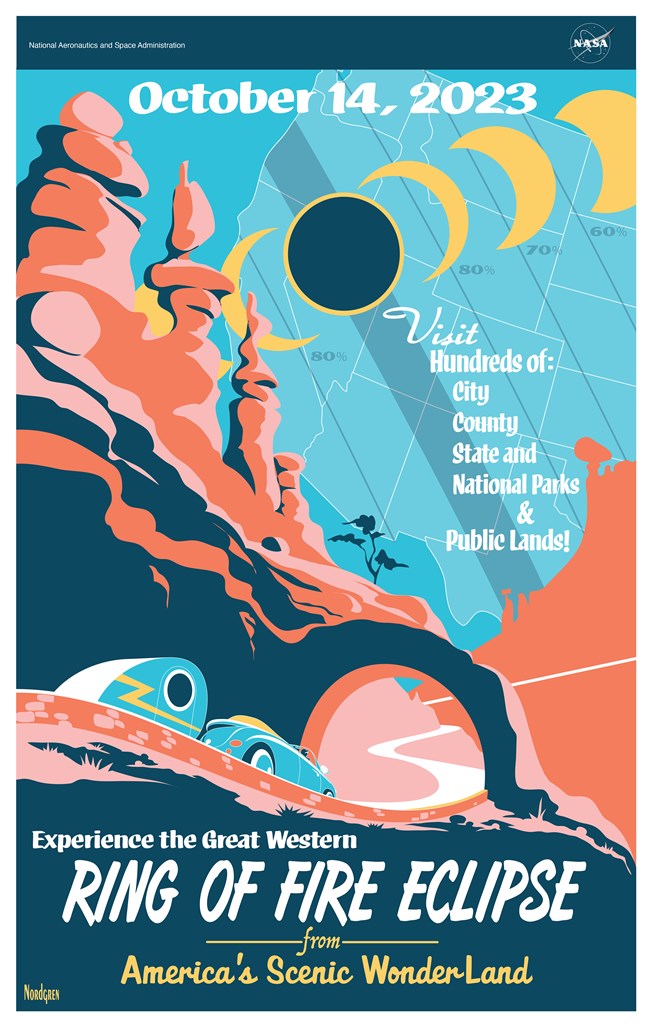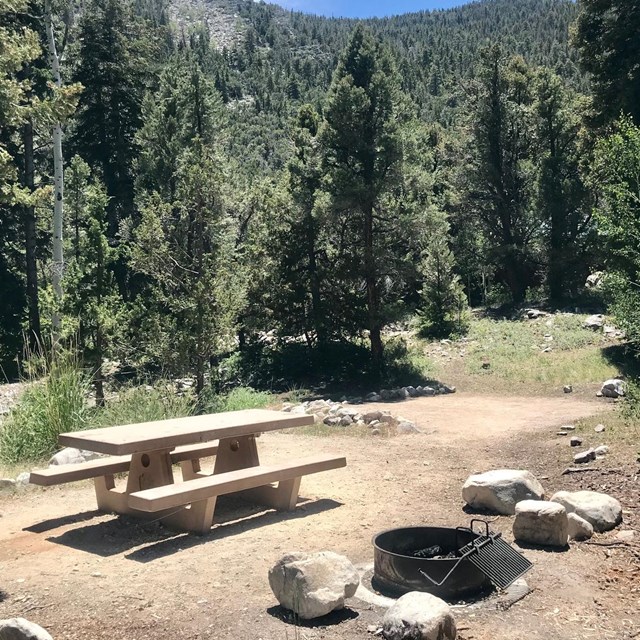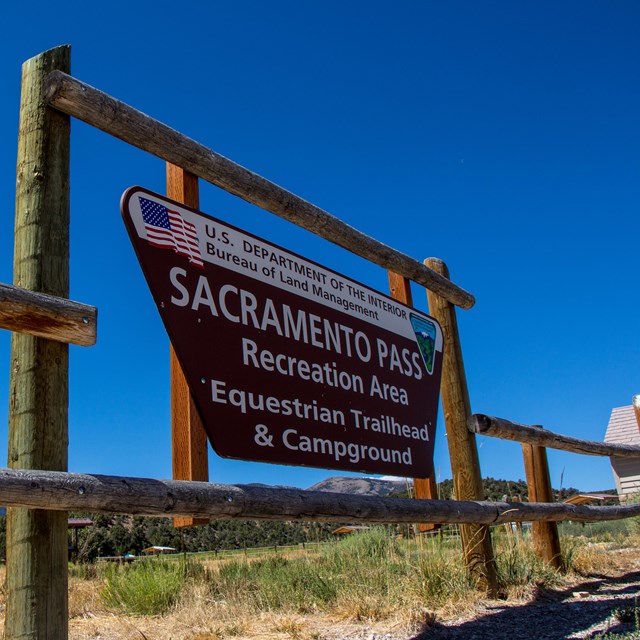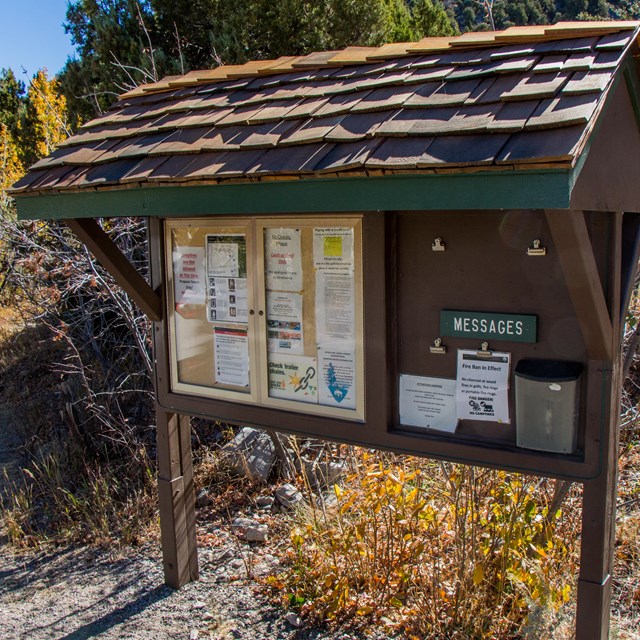Weekend Event Schedule Find times, dates, and event summaries at the drop down menus below. All sorts of information is available on this page and can be navigated to below.
1:00 - 3:00pm: Solar Telescope and Crafts - Join a park ranger for family & kid friendly activities behind the Lehman Caves Visitor Center. Peer through a solar telescope at our nearest star and make your own constellations. Free eclipse glasses, Jr Ranger Books, and eclipse event information will be available here.
6:30 - 8:30pm: Ranger Astronomy Program - Listen to a ranger at the Astronomy Amphitheater and peer into a moonless night sky through park-provided telescopes. Topics vary. Bring warm clothes! Other rules and information available here. 11:00 - 11:30am: Ranger Astronomy Program - Listen to a ranger at the Lehman Caves Visitor Center discuss a night sky related subject. Topics vary.
12:00 - 3:00pm: Solar Telescope and Crafts - Join a park ranger for family & kid friendly activities behind the Lehman Caves Visitor Center. Peer through a solar telescope at our nearest star and make your own constellations. Free eclipse glasses, Jr Ranger Books, and eclipse event information will be available here. 3:00 - 3:30pm: Ranger Astronomy Program - Listen to a ranger at the Lehman Caves Visitor Center discuss a night sky related subject. Topics vary. 6:00pm: Guest Speaker David Cheney - We are joined by NASA Heliophysicist David Cheney for this rare event! Thursday's Talk will cover what Heliophysics is, how NASA studies the sun, and how this research impacts us on earth. David Cheney served in the US Navy for 20 years as a nuclear power instructor and a meteorologist and oceanographer. Prior to serving in the military he taught math and science in high school and junior high in Utah. David is a program executive managing space projects for the Heliophysics Division of the Science Mission Directorate at NASA. David lived in Ely Nevada for eight years while he was growing up. 7:00 - 7:30pm: Ranger Astronomy Program - Listen to a ranger at the Astronomy Amphitheater discuss a night sky related subject. Topics vary. 7:00 - 10:00pm: Telescope Viewing/Star Party - Outside the Astronomy Amphitheater, park rangers and volunteers will be with telescopes showing views of the night sky and objects within it for all to see. 8:00 - 8:30pm: Constellation talk - A park ranger will guide you through the night sky at the Astronomy Amphitheater, right next to the telescope observing area. This program is accessible and open to all. 11:00 - 11:30am: Ranger Astronomy Program - Listen to a ranger at the Lehman Caves Visitor Center discuss a night sky related subject. Topics vary.
12:00 - 3:00pm: Solar Telescope and Crafts - Join a park ranger for family & kid friendly activities behind the Lehman Caves Visitor Center. Peer through a solar telescope at our nearest star and make your own constellations. Free eclipse glasses, Jr Ranger Books, and eclipse event information will be available here. 3:00 - 3:30pm: Ranger Astronomy Program - Listen to a ranger at the Lehman Caves Visitor Center discuss a night sky related subject. Topics vary. 6:00pm: Guest Speaker David Cheney - We are joined by NASA Heliophysicist David Cheney for this rare event! Friday's presentation will include the fundamentals of an eclipse, the difference between a total eclipse and an annular eclipse, and other fun facts about eclipses. David Cheney served in the US Navy for 20 years as a nuclear power instructor and a meteorologist and oceanographer. Prior to serving in the military he taught math and science in high school and junior high in Utah. David is a program executive managing space projects for the Heliophysics Division of the Science Mission Directorate at NASA. David lived in Ely Nevada for eight years while he was growing up. 7:00 - 7:30pm: Ranger Astronomy Program - Listen to a ranger at the Astronomy Amphitheater discuss a night sky related subject. Topics vary. 7:00 - 10:00pm: Telescope Viewing/Star Party - Outside the Astronomy Amphitheater, park rangers and volunteers will be with telescopes showing views of the night sky and objects within it for all to see. 8:00 - 8:30pm: Constellation talk - A park ranger will guide you through the night sky at the Astronomy Amphitheater, right next to the telescope observing area. This program is accessible and open to all. 7:30 - 11:00am: Eclipse Viewing Areas open - Join Astronomy Rangers and volunteers to look through Solar Telescopes and watch the eclipse! Viewing areas with limited parking will be set up at the Astronomy Amphitheater and the Great Basin Visitor Center where rangers can help you safely view and answer any questions. Free eclipse glasses will be available. Eclipse Timeline8:07am: The Eclipse Begins - The moon makes "first contact" with the sun from our earthly perspective. A partial eclipse will continue growing until second contact is made. 
White Pine County Tourism and Recreation On October 14, 2023 Great Basin National Park will experience one of the great astronomical events of local history: an Annular Solar Eclipse. This eclipse will obscure a portion of the sun for nearly three hours in the morning of that special Saturday. The next annular eclipse in the United States won't take place until 2041 making this an incredibly rare occurrence, if not once in a lifetime for many who come to see. What is an Annular Eclipse?An Annular Eclipse varies from a Total Eclipse in one major way. While a Total Solar Eclipse obscures the entirety of the sun at its peak totality, an Annular Solar Eclipse means that a small amount of annularity, popularly known as a "Ring of Fire," remains. These differences occur due to the moon's elliptical orbit around the Earth, so the distance is not constant and allows the moon to appear smaller or larger in the sky. Annular eclipses take place during a further part of the moon's orbit. When will it happen?During the morning of October 14th, 2023. The moon will experience its first visual contact with the sun at about 8:07am Pacific Daylight Time (PDT) that morning, and will fully obscure the sun by 9:26am PDT. At 10:53am PDT, the moon will finally leave the sun and the 2023 eclipse will have concluded. Historically, mild temperatures and clear skies prevail in October, but snow and thunderstorms are not unheard of. Clouds may well make the eclipse unviewable, but such is the nature of the skies! 
NASA What activities will be going on at Great Basin National Park?In response to this historic occasion, Great Basin will be holding a series of extra events in the days leading up to the eclipse, and guided viewing the morning of. While October usually begins a sleepier time in the park, we expect large crowds and many people to visit so plan ahead and have alternatives if your plan doesn't work out! Self-Guided Activities
Ranger Programs, Guest Speakers, and Virtual Events
Event Schedule 1:00 - 3:00pm: Solar Telescope and Crafts - Join a park ranger for family & kid friendly activities behind the Lehman Caves Visitor Center. Peer through a solar telescope at our nearest star and make your own constellations. Free eclipse glasses, Jr Ranger Books, and eclipse event information will be available here.
6:30 - 8:30pm: Ranger Astronomy Program - Listen to a ranger at the Astronomy Amphitheater and peer into a moonless night sky through park-provided telescopes. Topics vary. Bring warm clothes! Other rules and information available here. 11:00 - 11:30am: Ranger Astronomy Program - Listen to a ranger at the Lehman Caves Visitor Center discuss a night sky related subject. Topics vary.
12:00 - 3:00pm: Solar Telescope and Crafts - Join a park ranger for family & kid friendly activities behind the Lehman Caves Visitor Center. Peer through a solar telescope at our nearest star and make your own constellations. Free eclipse glasses, Jr Ranger Books, and eclipse event information will be available here. 3:00 - 3:30pm: Ranger Astronomy Program - Listen to a ranger at the Lehman Caves Visitor Center discuss a night sky related subject. Topics vary. 6:00pm: Guest Speaker David Cheney - We are joined by NASA Heliophysicist David Cheney for this rare event! Thursday's Talk will cover what Heliophysics is, how NASA studies the sun, and how this research impacts us on earth. David Cheney served in the US Navy for 20 years as a nuclear power instructor and a meteorologist and oceanographer. Prior to serving in the military he taught math and science in high school and junior high in Utah. David is a program executive managing space projects for the Heliophysics Division of the Science Mission Directorate at NASA. David lived in Ely Nevada for eight years while he was growing up. 7:00 - 7:30pm: Ranger Astronomy Program - Listen to a ranger at the Astronomy Amphitheater discuss a night sky related subject. Topics vary. 7:00 - 10:00pm: Telescope Viewing/Star Party - Outside the Astronomy Amphitheater, park rangers and volunteers will be with telescopes showing views of the night sky and objects within it for all to see. 8:00 - 8:30pm: Constellation talk - A park ranger will guide you through the night sky at the Astronomy Amphitheater, right next to the telescope observing area. This program is accessible and open to all. 11:00 - 11:30am: Ranger Astronomy Program - Listen to a ranger at the Lehman Caves Visitor Center discuss a night sky related subject. Topics vary.
12:00 - 3:00pm: Solar Telescope and Crafts - Join a park ranger for family & kid friendly activities behind the Lehman Caves Visitor Center. Peer through a solar telescope at our nearest star and make your own constellations. Free eclipse glasses, Jr Ranger Books, and eclipse event information will be available here. 3:00 - 3:30pm: Ranger Astronomy Program - Listen to a ranger at the Lehman Caves Visitor Center discuss a night sky related subject. Topics vary. 6:00pm: Guest Speaker David Cheney - We are joined by NASA Heliophysicist David Cheney for this rare event! Friday's presentation will include the fundamentals of an eclipse, the difference between a total eclipse and an annular eclipse, and other fun facts about eclipses. David Cheney served in the US Navy for 20 years as a nuclear power instructor and a meteorologist and oceanographer. Prior to serving in the military he taught math and science in high school and junior high in Utah. David is a program executive managing space projects for the Heliophysics Division of the Science Mission Directorate at NASA. David lived in Ely Nevada for eight years while he was growing up. 7:00 - 7:30pm: Ranger Astronomy Program - Listen to a ranger at the Astronomy Amphitheater discuss a night sky related subject. Topics vary. 7:00 - 10:00pm: Telescope Viewing/Star Party - Outside the Astronomy Amphitheater, park rangers and volunteers will be with telescopes showing views of the night sky and objects within it for all to see. 8:00 - 8:30pm: Constellation talk - A park ranger will guide you through the night sky at the Astronomy Amphitheater, right next to the telescope observing area. This program is accessible and open to all. 7:30 - 11:00am: Eclipse Viewing Areas open - Join Astronomy Rangers and volunteers to look through Solar Telescopes and watch the eclipse! Viewing areas with limited parking will be set up at the Astronomy Amphitheater and the Great Basin Visitor Center where rangers can help you safely view and answer any questions. Free eclipse glasses will be available. Eclipse Timeline8:07am: The Eclipse Begins - The moon makes "first contact" with the sun from our earthly perspective. A partial eclipse will continue growing until second contact is made. Where to view the Eclipse inside the parkGuided Viewing Areas
Self Guided ViewingMake sure to pick up eclipse glasses from a ranger at one of the visitor centers of viewing areas prior to trekking out on your own. It is never safe to view an annular eclipse without properly rated eye protection. These are not the only areas the eclipse will be visible from, but are the only places where parking may be available.

NASA / T. Nordgren Stay Safe and Protect your ParkCamping & LodgingIf the park doesn't experience any significant snowfall leading up to the eclipse, all five developed campgrounds will be open. All campgrounds will also be first-come, first-served. If you're unable to find a site within the park, speak to a ranger about primitive and dispersed camping alternatives outside the park. Camping outside of established campgrounds is strictly prohibited within the bounds of Great Basin National Park. Check current conditions and campground status here. Safe Viewing PracticesAnnular eclipses differ from total eclipses in that at no point is it safe to view the sun without properly rated eye protection! Come by either visitor center on the days leading to the eclipse or find a ranger the morning of for a free pair of eclipse glasses. We want to ensure everybody has a safe morning and the equipment to do so! Sunglasses are not sufficient protection for viewing the sun. Emergency AssistanceIN CASE OF EMERGENCY, ALWAYS CALL 911 OR SEEK OUT PARK STAFF Learn about Eclipses, Safety, and More!Eclipse CalendarCheck the calendar below as event specifics are updated. Camping during the eclipse
|
Last updated: February 1, 2025



